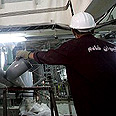
Iranian nuclear reactor in Bushehr
צילום: איי אף פי
U.S. plans economic sanctions on Iran
Americans estimate Tehran will not cease its nuclear plans; identifying banks financing exported Iranian oil, European companies trading with Iran is next move
The United States believes that the ultimatum which was given to Iran demanding to freeze its nuclear enrichment program by April 28 and the report of the head of the International Atomic Energy Agency (IAEA) will have no affect on the Iranian nuclear program.
A clear indication to the situation was given Sunday when the Iranian foreign ministry spokesman said that progress of the Iranian nuclear program is "irreversible."
The U.S has begun planning its own moves to face the conflict against Iran, not military moves but rather economic ones. Time Magazine reports that next month the U.S and the European Union will ask the U.N Security Council to pass a resolution that will pave the way to economic and political sanctions against Iran.
If, as anticipated, Russia and China - both of whom are permanent members of the Security Council – will torpedo the move by imposing a veto, the U.S. could employ a U.N-bypass track and form an international coalition which will isolate Iran "diplomatically and economically", as Undersecretary of State Nicholas Burns said last week.
Countries that trade with Iran should start reconsidering their commerce ties, he noted.
Along with reports about the U.S. preparing for military attack against the nuclear plants in Iran, the U.S. has also targeted economic moves; on its target are Europeans financial institutions that manage accounts for Iran and maintain generous deposits for Iran.
'Stop dealing with bad guys'
U.S. Secretary of State Condoleezza Rice met last week with the finance ministers of Britain and Germany, locations where, according to the U.S. treasury department, Iranian banks manage branches that maintain proceeds from Iranian oil export. The U.S. wants that non-Iranian banks to stop their cash flow to Iranian government.
As senior official involved in the economic sanctions told Time Magazine that the U.S. needs to convince the big financial institutions to stop dealing with the "bad guys" if they're concerned with their good names.
Lately, in preparation to such economic sanctions, Iran transferred some of its financial activities from Europe to the Gulf States. The U.S. was not far behind. Undersecretary of State for Arms Control and International Security Robert Joseph visited seven countries in the Middle East this month for discussions titles "what can be done to interfere with the Iranian activity", as he put it.
Economic sanctions, he added, could impede Iran's ability to purchase technology and knowledge from outside sources.
Another step could be a campaign to withdraw investments, similar to the one activated against the South Africa during the Apartheid period. A study by an American institution reveals that 124 European companies who are traded in stock markets around the world have commerce ties with Iran. The study also found that European banks finance large communication and energy projects for the Islamic republic.
The campaign to withdraw investments could prove difficult to pull, but American sources are hopping that if conscience will not help the companies to turn their back on Iran, an American threat to uncover their dubious connections will.










